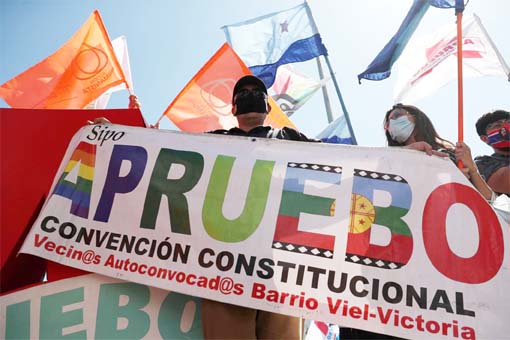
Reuters, Santiago :
Chileans will go to the polls on Sunday to vote on whether they want to swap a constitution written during the Pinochet dictatorship in favor of a new document written by a specially elected citizens’ body.
A new constitution was a key demand of demonstrators engaged in unprecedented social protests that broke out in October last year over inequality and elitism. A cross-party referendum deal emerged from the protests in December.
Those opposed to a new constitution argue it represents a “leap into the void” to change a document that has helped make Chile one of the region’s most stable free market economies.
Those in favor say the current text privileges private interests, and segments access to health, education and pensions by income.
Alejandro Werner, IMF Western Hemisphere director, said on Thursday the process could herald “a new era in which the main elements that generated the Chilean success story… are maintained in terms of economic growth, but complemented by a social inclusion agenda.”
A downside risk, he added, was “a multiplicity of social policies without macroeconomic support.”
Polls suggest the campaign to approve a new magna carta will win two thirds of the vote.
Cristobal Bellolio, a political commentator who favors a new text, said it would ensure the “nation’s fingerprints,” rather than those of a small elite, were on its rulebook.
The concern, he added, was that some might expect a new draft to turn Chile into a benevolent welfare state overnight.
“I get the feeling there are many people thinking of the constitution as a government program,” he said.
Chileans will go to the polls on Sunday to vote on whether they want to swap a constitution written during the Pinochet dictatorship in favor of a new document written by a specially elected citizens’ body.
A new constitution was a key demand of demonstrators engaged in unprecedented social protests that broke out in October last year over inequality and elitism. A cross-party referendum deal emerged from the protests in December.
Those opposed to a new constitution argue it represents a “leap into the void” to change a document that has helped make Chile one of the region’s most stable free market economies.
Those in favor say the current text privileges private interests, and segments access to health, education and pensions by income.
Alejandro Werner, IMF Western Hemisphere director, said on Thursday the process could herald “a new era in which the main elements that generated the Chilean success story… are maintained in terms of economic growth, but complemented by a social inclusion agenda.”
A downside risk, he added, was “a multiplicity of social policies without macroeconomic support.”
Polls suggest the campaign to approve a new magna carta will win two thirds of the vote.
Cristobal Bellolio, a political commentator who favors a new text, said it would ensure the “nation’s fingerprints,” rather than those of a small elite, were on its rulebook.
The concern, he added, was that some might expect a new draft to turn Chile into a benevolent welfare state overnight.
“I get the feeling there are many people thinking of the constitution as a government program,” he said.

